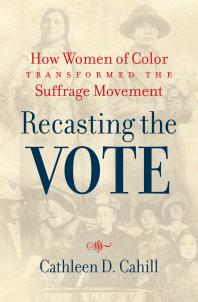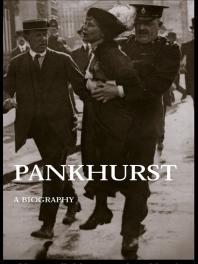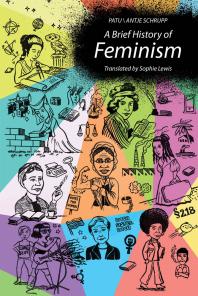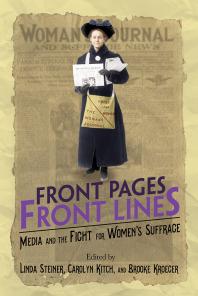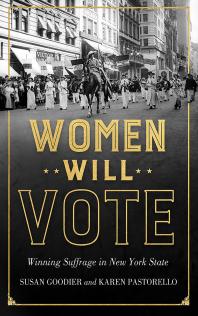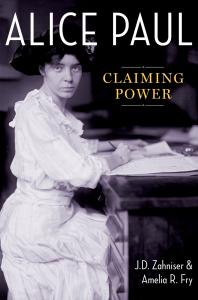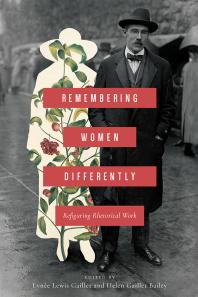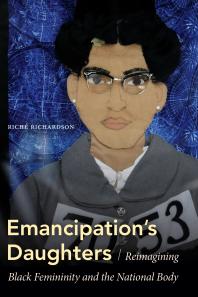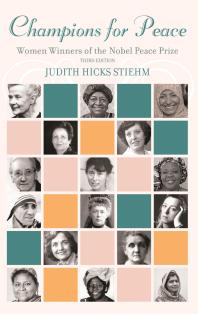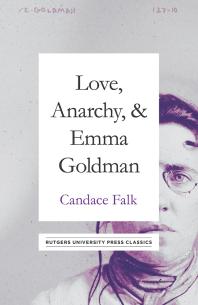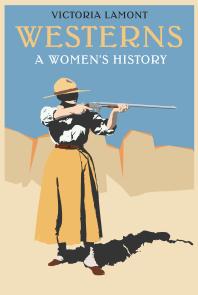"Valiant Women of the Vote: Refusing to be Silenced"
"The National Women’s History Alliance is determined that the important roles of multicultural suffragists and voting rights activists continue to be recognized and honored. We refuse to allow their voices to be silenced, even by a pandemic."
More information: National Women's History Alliance
Historical Activists
Christia Adair (1893-1989) - secretary of the NAACP, fought against Texas's "White Primary," which banned all voters of color from primary elections (further information)
- Hill, R. E., Ed. (2013). The Black women oral history project. ProQuest Ebook Central. https://ebookcentral.proquest.com
Daisy Elizabeth Adams Lampkin (c. 1884-1965) - president of Negro Women's Suffrage League in Pittsburgh, national field secretary of the NAACP (further information)
- Toner, A. (2013). The dynamic Daisy Lampkin. Western Pennsylvania History, 96(1), 10–11.
Ella Baker (1903-1986) - activist and organizer who helped create both the SCLC and SNCC in the 1960s (further information)
- Ella Baker (SNCC)
- Baker, Ella Josephine (The Martin Luther King, Jr. Encyclopedia)
Marie Louise Bottineau Baldwin (1863-1952) - lawyer, member of the Turtle Mountain band of Chippewa, clerk in the federal Office of Indian Affairs (further information)
- Cahill, C. D. (2013). Marie Louise Bottineau Baldwin: Indigenizing the Federal Indian Service. American Indian Quarterly, 37(3), 65–86. DOI: 10.1353/aiq.2013.0025
- 19th Amendment at 100: Mary Louise Bottineau Baldwin (US National Archives)
Sophonisba Breckinridge (1866-1948) - vice-president of the National American Woman Suffrage Association, first woman to practice law in Kentucky, dean of Chicago School of Civics and Philanthropy, and editor of Social Service Review (further information)
- Reclaiming Sophonisba (The University of Chicago, The Law School)
Melnea Cass (1896-1978) - community organizer who worked on the local, state, and national levels; active in the NAACP, NACW, Women's Service Club, Women in Community Service, Action for Boston Community Development, Boston Equal Rights League, and several other organizations; known as the "First Lady of Roxbury" (further information)
- Dr. Melnea Agnes Jones Cass (National Park Service)
- Hill, R. E. (Ed.). (2013). The Black women oral history project. ProQuest Ebook Central. https://ebookcentral.proquest.com
Coralie Franklin Cook (1861-1942) - educator and one of the founders of the National Association of Colored Women (further information)
- Brown, S. M. (2019, November 28). Suffragist Coralie Franklin Cook: First descendant of Monticello. Washington Informer, 55(7), 17, 53.
Mary Church Terrell (1863-1954) - public speaker and advocate for suffrage and civil rights, she continued demonstrating until she was 90 (further information)
- Mary Church Terrell, suffragist and civil rights activist (Law Librarians of Congress)
Fannie Lou Hamer (1917-1977) - former sharecropper who became a voting-rights activist in 1962 when she first learned she had the right to vote (further information)
- Brooks, M. P., Houck, D. W., & Houck, D. W. (Eds.). (2010). Speeches of Fannie Lou Hamer: To tell it like it is. ProQuest Ebook Central. https://ebookcentral.proquest.com
- Brooks, M. P. (2014). A voice that could stir an army: Fannie Lou Hamer and the rhetoric of the Black freedom movement. ProQuest Ebook Central. https://ebookcentral.proquest.com
Mabel Ping-Hua Lee (c. 1895-c. 1966) - helped lead one of the largest suffrage marches in the country's history in 1912, even though Chinese-born immigrants could not become naturalized citizens until 1943 (further information)
- Dr. Mabel Ping-Hua Lee (National Park Service)
- Mabel Ping-Hua Lee (National Women's History Museum)
Lucy Nicolar (1882-1969) - member of the Penobscot nation in Maine, advocated for better access to the mainland for the island reservation; in 1954, after fighting for the repeal of a state law that disenfranchised reservation-dwelling Indians in state elections, became the first such person to vote in Maine (further information)
- Lucy Nicolar goes far from a Maine Indian reservation — and then returns (New England Historical Society)
J. Frankie Pierce (1864-1954) - suffrage and desegregation activist, founder and superintendent of Tennessee Vocational School for Colored Girls, a school for "delinquent" girls intended to prepare them for college as well as the workplace (further information)
- Goodstein, A. (1998). A rare alliance: African American and white women in the Tennessee elections of 1919 and 1920. The Journal of Southern History, 64(2), 219-246. doi:10.2307/2587945
- Bliss, J. (2019, November 13). New Nashville park to be named for influential African American women's suffrage leader Frankie Pierce. The Tennessean.
Josephine St. Pierre Ruffin (1842-1924) - founder of the first African-American-women's newspaper and the first such civic organization (further information)
- Josephine St. Pierre Ruffin’s "Address to the First National Conference of Colored Women" 1895. (2017). Milestone Documents in African American History.
- "Josephine St. Pierre Ruffin, a pioneer in the Black women's club movement" (Part 2 of the article from The Bay State Banner)
Charlotta Rollin (1849-?) - founder of the South Carolina chapter of the American Woman Suffrage Association (further information)
- The Rollin sisters (Columbia City of Women)
Florida Ruffin Ridley (1861-1943) - daughter of Josephine St. Pierre Ruffin, helped her organize the Women's Era Club and editor of the Woman's Era (further information)
- Brookline elementary school is renamed for Black activist Florida Ruffin Ridley (WBUR)
- Women of the past & present shaping the future (Archives and Public History at UMass Boston)
Sojourner Truth (c. 1797-1883) - a former slave, Truth is known as an abolitionist, but she also spoke out in favor of suffrage (further information)
- Truth, S. (2017). The narrative of Sojourner Truth. ProQuest Ebook Central. https://ebookcentral.proquest.com
- The Sojourner Truth project - comparison between two published versions of Truth's famous "Ain't I a Woman?" speech
Harriet Tubman (1820-1913) - Tubman is best known for her actions with the Underground Railroad, but after the Civil War, she began giving speeches in favor of voting rights and equality (further information)
- Humez, J. M. (2003). Harriet Tubman: The life and life stories. ProQuest Ebook Central. https://ebookcentral.proquest.com
Ida B. Wells-Barnett (1862-1931) - best known as an anti-lynching activist, Wells-Barnett was also a significant figure in the fight for suffrage (further information)
- Duster, M. (2020). Continuing my great-grandmother's fight. TIME Magazine, 196(9/10), 24–25.
- A noble endeavor: Ida B. Wells-Barnett and suffrage (National Park Service)
Wilhelmine Kekelaokalaninui Widemann Dowsett (1861-1929) - leader of the Women's Equal Suffrage Association of Hawai'i (further information)
- Wilhelmine Kekelaokalaninui Widemann Dowsett (National Park Service)
- Biographical sketch of Wilhelmine Kekelaokalaninui Widemann Dowsett (Alexander Street)
Zitkála-Šá, aka Gertrude Simmons Bonnin (1876-1938) - Yankton Sioux, worked at the Bureau of Indian Affairs, advocated for Native American rights (further information)
- Cahill, C. D. (2020). Our democracy and the American Indian: Citizenship, sovereignty, and the native vote in the 1920s. Journal of Women’s History, 32(1), 41-51.
- Zitkala-Ša (Red Bird / Gertrude Simmons Bonnin) (National Park Service)
Current-Day Activists
Stacey Abrams (1973- ) - former nominee for Georgia governor, founder of Fair Fight, an organization devoted to protecting voting rights
- Smith, J. (2018, Aug.). Stacey Abrams. Rolling Stone, (1337), 74.
- Boyd, V. (2019). Carving a path for those who will follow: Stacey Abrams in conversation with Valerie Boyd. Southern Cultures, 25(3), 22-29. https://doi.org/10.1353/scu.2019.0027
Arekia Bennett (1993- ) - executive director for Mississippi Votes (further information)
- Burch, A. D. S. (2018, September 26). Voter registration drive gets reinforcements. New York Times, A12.
LaTosha Brown (1970- ) - co-founder of Black Voters Matter Fund (further information)
- Vinick, A. (2021, February 23). 2021 Martin Luther King Jr. celebration features LaTosha Brown. UWIRE Text, 1.
- Aggarwal-Schifellite, M. (2021, February 9). LaTosha Brown puts her whole being into increasing voter turnout. States News Service.
Helen Butler - executive director for the Georgia Coalition for the People's Agenda (further information)
- Suggs, E. (2020, November 11). BLACK VOTERS: Black organizations work to help boost Democrats: They expand voter rolls for disenfranchised populations across state. The Atlanta Journal-Constitution, A1.
- Overcoming challenges, Georgians vote in record numbers. Organizers want to keep them engaged (WABE)
Melanie L. Campbell (1961- ) - president and CEO of the National Coalition on Black Civic Participation and convener of the Black Women's Roundtable (further information)
- Williams, V. (2020, November 3). "This is how democracy crumbles": Melanie Campbell on the fight to defend Black votes. The Washington Post.
- The National Coalition on Black Civic Participation
Kristen Clarke (1997- ) - president and executive director of the National Lawyers’ Committee for Civil Rights Under Law, nominee to become head of US Department of Justice Civil Rights Division (further information)
- Davis, J. B. (2016, August 1). A modern movement: from the helm of a historic agency, Kristen Clarke is a leader in the 21st century fight for civil rights. ABA Journal, 102(8), 12.
Dolores Huerta (1930- ) - with Cesar Chavez, co-founder of the United Farm Workers of America, has been an activist and community organizer for over 65 years (further information)
- Sowards, S. K. (2020). Dolores Huerta, the United Farm Workers, and people power: Rhetorical participation in Latina/o/x suffrage and social movements. Quarterly Journal of Speech, 106(3), 285–290. https://doi.org/10.1080/00335630.2020.1785635
- Dolores Huerta (National Parks Service)
Esmeralda Simmons (1950- ) - civil rights lawyer and founder and executive director of the Center for Law and Social Justice at Medgar Evers College (further information)
- Abdulaleem, M. (2009, October). Esmeralda Simmons: "Staying on course for freedom and justice" for her community. New York Amsterdam News 100(40), 5, 39.
- Esmeralda Simmons (The New York State Senate)
Ciara Taylor (1990- ) - co-founder of Dream Defenders, an organization devoted to issues affecting young people of color (further information)
Allie Young (1990- ) - founded both Protect the Sacred and Ride to the Polls during the Covid-19 pandemic (further information)
- Page, S. (2020, November 2). Getting to the polls can be hard in Navajo Nation. This woman is leading voters on horseback. The Washington Post.
Additional Readings and Resources
-
US Women's Suffrage Timeline 1648 to 2016National Parks Service
-
How women got the vote is a far more complex story than the history textbooks revealSmithsonian Magazine
-
"Women's Suffrage"The New York Times tagged articles
-
In 1920, Native women sought the vote. Here’s what they seek now.The New York Times
-
Weekend Read: The struggle for Native American voting rightsSouthern Poverty Law Center
-
100 Years after suffrage, Native American women still fighting to voteWomen's Media Center
-
Obstacles at every turn: Barriers to political participation face by Native American voters [PDF]The Native American Rights Fund
-
Defend Our JusticeBrennan Center for Justice Initiatives at NYU
-
Ensure Every American Can VoteBrennan Center for Justice Initiatives at NYU
-
Gerrymandering and Fair RepresentationBrennan Center for Justice Initiatives at NYU
-
Rock the VoteOrganization that works to educate and encourage young voters,
-
The League of Women VotersOrganization that works to protect voting rights and to expand voting access nationwide
-
Election ProtectionOrganization that provides voting information and support to voters nationwide
-
Let America VoteOrganization that works to combat voter suppression.
-
Southern Poverty Law CenterOrganization that promotes voting and protects voting rights
-
Fair FightOrganization that was started by Stacey Abrams to promote voter participation and fair elections in Georgia and nationwide.


